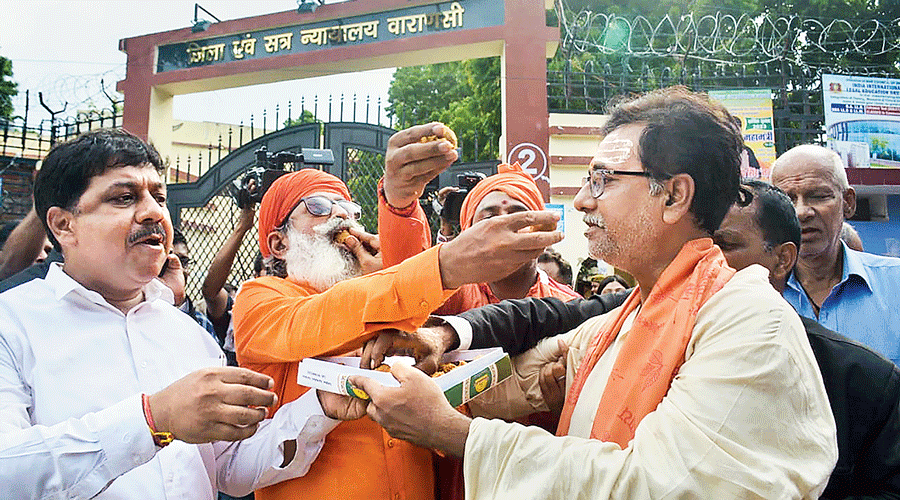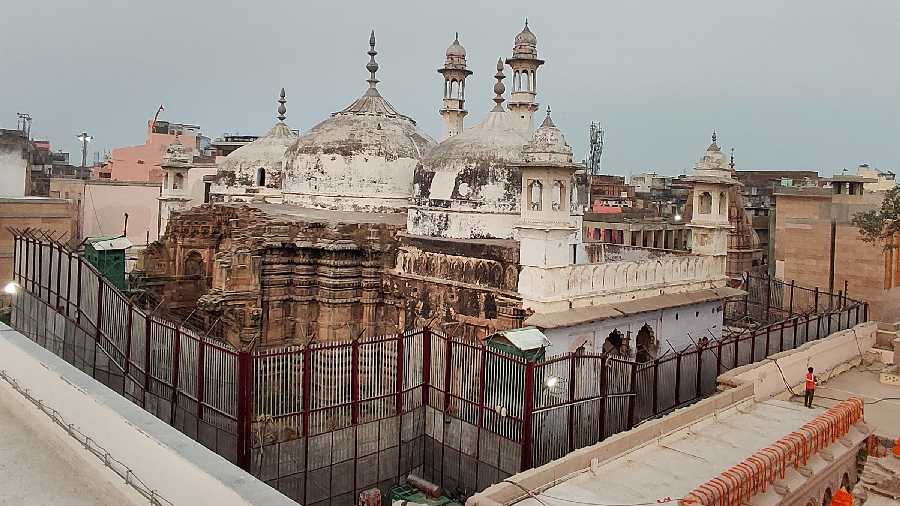The Varanasi district court on Monday upheld the maintainability of a petition seeking permission for Hindus to worship daily before certain figurines on the inner surface of the Gyanvapi mosque’s boundary wall, rejecting a plea from the mosque management.
This means the petition by five Hindu women for daily worship rights at the Shringar Gauri, where Hindus can currently pray only on one particular day a year, will now come up for hearing, with the court listing it for September 22.
Eminent Lucknow cleric Khalid Rashid Firangimahli appealed to Muslims “not to overreact or feel bad” and underlined the option of moving higher courts.
The Anjuman Intezamia Committee that manages the mosque will challenge Monday’s order before Allahabad High Court, a counsel for the committee said.
Shivam Gaur, an advocate representing one of the women petitioners, dismissed claims by some Hindus that the order would set a “precedent” at a time petitions before various courts have sought a Hindu takeover of the premises of mosques such as Gyanvapi and the Idgah in Mathura. “A precedent is set when high courts or the Supreme Court pass an order,” he said.
Lawyers underscored that Monday’s order was anyway not a verdict on the Shringar Gauri petition.
The Intezamia had questioned the maintainability of the women’s petition, citing the Places of Worship (Special Provisions) Act, 1991, which says the character of any public place of worship must be maintained as it was on August 15, 1947, with the exception of the Ramjanmabhoomi-Babri Masjid.
District and sessions judge Ajaya Krishna Vishvesha’s 26-page order said the Hindu women’s suit was not barred by the 1991 law “and the application 35C filed by the defendant no. 4 (Intezamia) is liable to be dismissed”.
The court explained: “According to the pleading of the plaintiffs, they were worshipping Maa Shringar Gauri, Lord Hanuman, Lord Ganesh at the disputed place incessantly since a long time till 1993. After 1993, they were allowed to worship the above mentioned Gods only once in a year under the regulatory of state of Uttar Pradesh.
“Thus, according to plaintiffs, they worship Maa Shringar Gauri, Lord Hanuman at the disputed place regularly even after 15th August 1947. Therefore, the (1991 law) doesn’t operate as bar on the suit of the plaintiffs.”
Intezamia counsel Merazuddin Siddiqui regretted that the court had ignored “our claim that Muslims have been offering namaz there for many centuries and some Hindus have encroached there only in recent decades”.
“We will study the order and petition Allahabad High Court with better preparations to fight the case,” he said.
‘Shivalinga’
In June, a civil judge (senior division), before whom the petition was moved last year, had ordered a survey of the entire Gyanvapi premises by a court-appointed commission.
The commission claimed to have found a “Shivalinga”, which the Intezamia said was merely a part of a defunct fountain used in the past for wuzu, the ritual cleansing before prayers.
Later, the Supreme Court shifted the case to the district court, saying a more senior judge should handle the sensitive matter.
Sohan Lal, lawyer for one of the five petitioners, said the survey report on the “Shivalinga” too would come up when the petition is heard from September 22.
Some Hindus have cited the “Shivalinga” as proof that the Gyanvapi was built after demolishing a part of the original Kashi Vishwanath temple on Aurangzeb’s orders. The Mughal emperor is also accused of having parts of the Krishna Janmasthan temple in Mathura destroyed and the Idgah mosque built on the spot.
Petitions have been moved before courts in Mathura and Varanasi for the relocation of these two mosques and handover of their premises to Hindus.
Union minister Giriraj Singh exulted over Monday’s order, saying in Delhi: “Our religious places were destroyed in the past. The court is doing justice to us.”
As news of the court order spread, some people distributed sweets outside the premises.
Firangimahli, the Lucknow cleric, said: “I appeal to Muslims not to overreact or feel bad about the court order. After all, it is only a legal matter and we have options to move the high court and the Supreme Court for justice.”
A ban on assemblies remained in place in Varanasi but the beefed-up police presence was lightened after 3pm – an hour after the court order – as the city remained peaceful.
Currently, Hindus are allowed to worship at the Shringar Gauri only on the fourth day of Chaitra Navratri.
The five women petitioners are Rakhi Singh of Delhi and Lakshmi Devi, Sita Sahu, Manju Vyas and Rekha Pathak of Varanasi.












